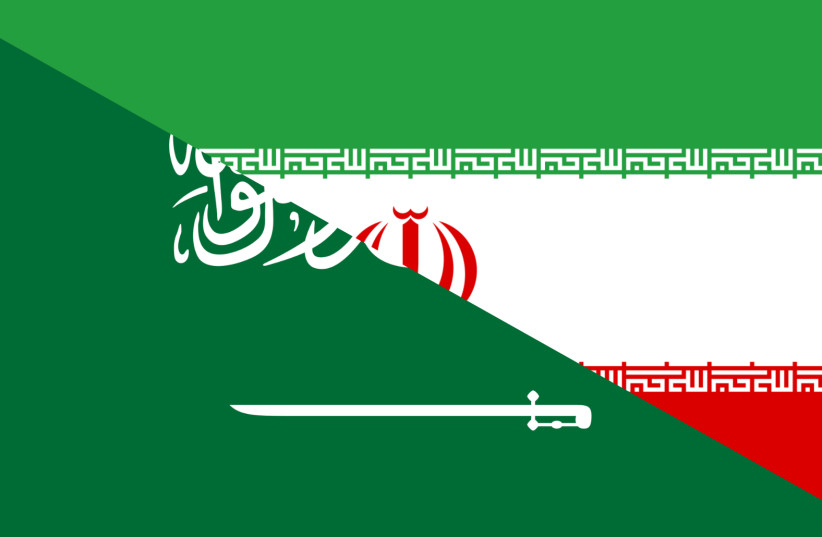Iranian pro-government media messaging in the wake of the Iran-Saudi deal has portrayed the deal as a major setback for the US and Israel. This is interesting because the pro-regime analysis at news organizations such as Tasnim News in Iran appears to dovetail with some commentators in the West who also see the deal as a blow to the two Western allies.
It is clear that Iranian pro-regime media is not coming to this conclusion in agreement with those in the West who are pro-Israel and critics of Iran but worried about the deal’s ramifications.
Instead, Iranian media, with support from the regime and the IRGC (Islamic Revolutionary Guard Corps), is messaging about this deal in such a way as to portray it as some kind of real-world chess game.
The concept of three-dimensional chess is one in which something is overly complicated and not played out in a linear or two-dimensional landscape. Iran’s regime doesn’t want to send the message that the deal with Saudi Arabia was simply due to necessity and pragmatism and that Iran is now pro-Saudi. Instead, it wants to message that it is doing more than just normalizing ties with Riyadh, pretending that it has done so to undermine the US and Israel.
According to the Tasnim International News Agency report, “the developments in the region in the recent stage have moved in different directions, which shows that the period of maneuvers and benefits of the US and the Zionist regime – from the tension in the relations of the countries of the region to stabilize the existence of Israel and create a Zionist-Arab coalition against Iran and the axis of resistance – is over.” This convoluted statement means that the new Saudi-Iran deal is part of a larger process by which Tehran and its “resistance” allies in the region are reversing several years of Israeli success that came about via the Abraham Accords.

The Abraham Accords concerned Iran
IRAN WAS very worried by the Abraham Accords. It was wary of Israel’s ties with Bahrain and the UAE and potential ties with Saudi Arabia. Iranian media often tried to undermine the Gulf States that were working with the Jewish state. Iran also mobilized groups like the Houthis to threaten Saudi Arabia and the Emirates. The Houthis in Yemen are also anti-American and anti-Israel.
Iran’s pro-regime media had several articles this week describing the Iran-Saudi deal as a blow to the US in the region. The recent report says that this is “the beginning of the decline of American influence in the region.” This narrative is interesting because even though the Islamic Republic’s media says the agreement is important and changes seven years of tensions between Iran and Saudi, the claims also portray this as part of the process of US withdrawal from Afghanistan and also say that the US has failed in Syria and Ukraine.
Why does Iran’s regime think it also has to portray the deal as a setback for Israel? Iran is spreading this message because of this “3-D chess” game, where it wants to pretend it did one thing – signing a deal with Riyadh – in order to achieve something else: the erosion of Israeli influence in the Gulf.
There’s no evidence that the deal with Saudi Arabia is a setback for Israel, however. Iran wants to spread this message precisely because this is not actually an aspect of the deal. The Saudi-Iran deal reported elsewhere in the region, such as Turkey, is seen as pragmatic and will include potential trade and investment. This is a “constructive” deal, according to an article at Turkey’s Anadolu.
Iran’s messaging is different. It wants to claim the deal is actually related to the US and Israel. Tehran has been claiming to “resist” them for decades.
This is part of its general propaganda in the region. It mobilizes Hezbollah, militias in Syria and Iraq, and the Houthis in Yemen under the banner of fighting Israel and the US. But this “axis of resistance” is largely a propaganda story. Iran uses claims of opposing these two Western powers as a way to get its foot in the door in places like Lebanon, Syria and Iraq.
It then exploits local conditions to get a stranglehold on the economy and politics, and to hollow out the state and profit off the decline of these countries. While it puts up a banner of “opposing the US,” overall everyone who has watched Lebanon over the last decade and a half should notice that the “resistance” has bankrupted Lebanon, but hasn’t opposed the US or Israel any more than it used to. This shows that Iran’s messaging is largely used to sugar-coat reality.
